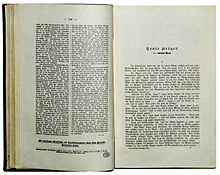托尼奥·克律格
| 托尼奥·克律格 | |
|---|---|
 | |
| 原名 | Tonio Kröger |
| 中文名 | 托尼奥·克律格 |
| 作者 | 托马斯·曼 |
| 译者 | Frederick Alfred Lubich |
| 类型 | 自传小说 |
| 语言 | 德语 |
| 發行信息 | |
| 出版時間 | 1903 |
| 出版地點 | 德国 |
| 媒介 | |
| 规范控制 | |
| OCLC | 3512222 |
《托尼奥·克律格》是托马斯·曼的中篇小说,初作于1901年初,其年25岁。 这部小说最早出版于1903年。 阿尔弗雷德·诺普(En: A. A. Knopf)于1936年在纽约发行了这部小说的第一个美国版本。[1]
简介
[编辑]故事的轨迹沿着一个男人从学生时代到成年的发展展开。 一个德国北部商人和拥有艺术天赋的“南方”母亲(Consuelo)的儿子,托尼奥继承了他父母双方的特质。 在他仍是一个孩子的时候,他体验到对周遭小市民们的富有矛盾的情绪。 他一方面因为自己的内涵修养而感到优越,另一方面又倾慕于那些人充满无知的活力。这种矛盾一直延续到托尼奥的成年时期,那时他已经成为了德国南部的著名作家。他开始相信,“作为一个艺术家,对于日常生活而言他必须死去。”这些问题在他向北旅行回到他的故乡时得以部分解决。在那里,托尼奥被误认为是一个逃犯,这更加坚定了他内心的信仰——一个艺术家相对于“受到尊敬的”社会生活来说必须是一个局外人。艾利·海勒(En: Erich Heller)——他认识托马斯·曼本人——认为,《托尼奥·克律格》的主题是“艺术家是自现实的放逐”(与歌德的戏剧《托尔夸多·塔索》(1970)和格里帕泽的《萨福》(1818)一道)。[2] 然而,艾利·海勒本人年轻时,将《托尼奥·克律格》的主题视为一个富有激情的内心之迷恋和纠结,注定要把它的感受智性化为艺术。[3]
与其他作品的联系
[编辑]《托尼奥·克律格》与更著名的一个故事《威尼斯之死》(Der Tod in Venedig)遥相呼应。它们都通过描述艺术家的生活来呈现托马斯·曼本人对艺术的看法。一个故事中艺术家从南方旅行至北方,另一个则从北方旅行至南方。一个旅程结束于一场精致的和解,另一场则以艺术家的死亡告终。 但,如特伦斯·詹姆斯·里德(En: T. J. Reed)指出的那样,
- “在《威尼斯之死》中,托马斯·曼从对寓言故事的涉足中回归,再一次径直写起了一个文学艺术家的故事。但那与《托尼奥·克律格》不同,在那里他径直用文字来表述他的直接体验,这些体验直接来自于他本人...”[4]
因而这部作品的重要性主要体现在它那“自传式的角色”,以及通过对“同窗之爱”(amitié particulière)的描摹所体现的爱情理论(theory of love)。
这部小说曾于1964年被改编作电影,导演为罗尔福·席勒(En: Rolf Thiele)。[5]
参看
[编辑]- 茱莉亚·达·席尔瓦-布鲁恩斯(De: Júlia da Silva-Bruhns),托马斯·曼的母亲,托尼奥的母亲Consuelo的原型。
参考
[编辑]- Erich Heller, The Ironic German: A Study of Thomas Mann (London, Secker & Warburg, 1958), pp. 68ff. (on the genesis of the work), 286 (on the date of publication).
- Frank Donald Hirschbach, The Arrow and the Lyre: A Study of the Role of Love in the Works of Thomas Mann (The Hague, M. Nijhoff, 1955), passim (but especially the section "The Loves of Two Artists: Tonio Kröger and Death in Venice", op. cit., pp. 14ff.).
- Lee Slochower, "The Name of Tadzio in Der Tod in Venedig", German Quarterly, vol. 35, No. 1 (January 1962).
- Alfred D. White, "Tonio Kröger: Anthropology and Creativity", Oxford German Studies, vol. 34, No. 2 (September 2005), pp. 217–223.
引注
[编辑]- ^ Stories of Three Decades的馆藏信息(WorldCat在线联合目录)<
- ^ Erich Heller, The Disinherited Mind: Essays in Modern German Literature and Thought (Cambridge, Bowes & Bowes, 1952), p. 167. Cf. id., The Disinherited Mind (Harmondsworth, Penguin Books, 1961), p. 187.
- ^ Erich Heller, Flucht aus dem zwanzigsten Jahrhundert: Eine kulturkritische Skizze (Vienna, Saturn-Verlag, 1938), p. 9.
- ^ T. J. Reed, Thomas Mann: The Uses of Tradition (2nd ed.; Oxford, Clarendon Press, 1996), p. 144.
- ^ 互联网电影数据库(IMDb)上《Tonio Kröger》的资料(英文)(英文)
外部链接
[编辑]- Tonio Kröger - 古腾堡计划 (德文)
| |||||||||||||||||||||||||||
| ||||||||||||
Text is available under the CC BY-SA 4.0 license; additional terms may apply.
Images, videos and audio are available under their respective licenses.
